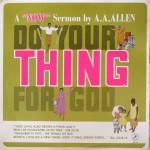 Given last week’s heavy and well-received post on Rios Montt and Guatemala and given that summer is almost here, perhaps it’s time to lighten up…for the next few weeks, I’ll post some interesting things I’m finding in writing my new book, “Pentecostalism in America,” due out sometime in the near future with Columbia University Press.
Given last week’s heavy and well-received post on Rios Montt and Guatemala and given that summer is almost here, perhaps it’s time to lighten up…for the next few weeks, I’ll post some interesting things I’m finding in writing my new book, “Pentecostalism in America,” due out sometime in the near future with Columbia University Press.
This week recalls some trips to evangelical/Pentecostal bible colleges, where social dancing is prohibited, drinking is done off grounds and out of sight, relationships are wholesome, and rules are rules. Where, if you play your cards right, (for fun of course, never for money), you may find a catch, a suitable marriage partner for the rest of your life–someone like Mark Driscoll–Seattle’s own stubbly hypermasculine celebrity pastor, whose oversharing in his last book on Real Marriage–I can’t wait to read. Better yet, I can’t wait to teach the Spanish version to an unsuspecting “Damas del Señor” bible class. No doubt the first and last bible class I will ever teach.
I have been told numerous times that women go to meet their future husbands at these bible colleges and universities. There is a selection process intended to weed out anyone who a woman or man might consider unequally yolked. I know quite a few of these pairings, some more successful than others, all of them met at these colleges and universities. These pairings, I’m afraid, are actually orchestrated, very much like the rest of the marriage industry. This industry, created by mid-20th century marketers of jewelry and other assorted wedding accoutrement, is not the only thing manufactured, since, it is at these bible colleges and universities, where, with apologies to Noam Chomsky, evangelicals are busy manufacturing consent–to appropriate dress, to appropriate dating, to appropriate gender roles and eventually to marriage. Here are only a few examples.
Taking these codes as a whole, they are aimed at one purpose–to maintain marriage as the final culmination of one’s life. Georgia’s Emmanuel College students’ sexual lives are strictly regulated in accordance with what the college promotes as biblical teaching. As such, premarital, extramarital, and homosexual relationships, described as both ”acts and practices” are forbidden. Emmanuel’s dress codes are in keeping with the goals of regulating women’s dress and behavior by explicitly making it a way to de-sexualize women. Men’s dress on the other hand, while subtly arresting some physical attraction, (assuming seeing men without shirts is considered alluring, which I would argue, really depends), are meant to make them more professional, to erase the boyish appearance of youthful immaturity with the more “grown-up” look of shirts and slacks, where t-shirts are to be worn under all shirts–apparently to cover as much skin as possible. The restrictions do not stop at what students can wear, the behavior codes cover what they can watch (no r-rated movies), listen to(no rock and roll), and where they can go outside of campus (no taverns or “gentlemen’s clubs”), the latter seeming rather obvious since only gentlemen’s clubs I know of today have poles in them.
 A perennial favorite for restriction since perhaps the mid 19th century, but definitely since the late 19th century Holiness movement, is the prohibition on dancing. Dancing and many other forms of physicality are regulated heavily. Here is a sample: “Students should at no time engage in overt demonstrations of affection, physical displays of affection in public or private that include but are not limited to excessive kissing, inappropriate touching or laying down on couches.” (The last one I imagine would be self-explanatory).
A perennial favorite for restriction since perhaps the mid 19th century, but definitely since the late 19th century Holiness movement, is the prohibition on dancing. Dancing and many other forms of physicality are regulated heavily. Here is a sample: “Students should at no time engage in overt demonstrations of affection, physical displays of affection in public or private that include but are not limited to excessive kissing, inappropriate touching or laying down on couches.” (The last one I imagine would be self-explanatory).
Elim Bible Institute in upstate New York includes restrictions for dating as well as dress. Its dress and behavior codes are focused on professionalizing the students, minimizing their casual appearance, and again de-emphazing women’s sexuality much more than men. For men, there are no muscle shirts, shorts, hats or earrings. For women, there are no low-cut blouses or sleeveless tops. (Michelle Obama has almost no chance of being invited here regardless). The rules governing behavior are aimed not only at reinforcing the moral codes of the school, but in regulating the social lives of the students’ relationships, more so than at Emmanuel.
At Elim, freshmen cannot date and they need written permission from parents and the Dean to continue an ongoing relationship. There is no explanation for this given so we can speculate that because freshman are normally expected to be younger than most other students, their perceived immaturity worries school officials. More curious is the prohibition against engaged couples continuing their relationship on campus, which requires a Dean’s approval and authorization to do things such as hold hands. As a deterrent to interrupting their studies, students are encouraged to wait till they graduate to get married. Still, the idea that approval from a school official will deter an engaged couple from holding hands seems quaint to an outsider but makes perfect sense in a Pentecostal context where bible institutes serve as a traditional bridge from adolescence to adulthood.
Zion Bible College outside Boston, stresses similar dress and behavior codes regarding modest dress, professionalism, and restrictions on dating, kissing, holding hands, and any kind of “physical familiarity.” In a nod to Pentecostalism’s nearly universal denial that same-sex attraction occurs or is even possible, Zion actually allows female same-sex sleep-overs in the dorms, though one doubts that this freedom would extend to men as well as women. The behavioral codes, especially regarding homosexuality include coded references to “behavior or practices,” assuming one can tell who is and who is not gay by examining specific non-sexual behavioral patterns. Finally, Evangel University in Missouri is most direct and complex in its rules for behavior and dress. The student handbook states that everything that is not in keeping with “biblical principles” is forbidden. In contrast, their system of punishments for varying levels of infractions is dizzying in its detail. For first offenses for improper displays of affection, there are no sanctions. Social dancing is an “alert level 2” with a $25 fine. The second offense is punishable by up to 8 weeks probation and another fine. The levels for sexual infractions are so numerous that it may be worth noting that Evangel punishes both gay and straight forms of sexual activity. There are levels of punishment for having sex outside of marriage. There are various levels of punishment for “sexting,” but not as serious as say genital contact or oral sex, which are both level one infractions, and both have a $100 fine with the possibility of STD testing required afterward. I have heard dozens of stories from students regarding these dress and behavioral codes. They are either: necessary, good, bad, stupid, unreasonable, and often, simply too onerous to bear. One group of dorm mates established a kind of infraction fund they kept in a jar–just in case. (Anonymity here is very important, so don’t ask).

One can see here the foundation of the evangelical marriage seminar industry, the “I Left Dating Behind” books, the chastity rings, and yes, if you look really closely, you can see a slightly stubbly Mark Driscoll talking about submission and his “smokin’ hot wife,” and if you don’t blink, perhaps you can see future husbands and wives putting money into the jar on a Friday night.
an alternate version of this post appeared in the blog USReligion, its has been edited for inclusion here.












